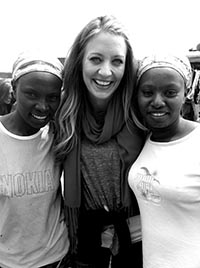We recently talked with Pastor Matt Chandler about The Village Church, child sponsorship, the poor and his book, The Explicit Gospel.
Can you tell us about The Village’s partnership with Compassion in Guatemala?
We wanted tangible ways for the church to gauge the world around them. Relational and tangible ways. Compassion was our best option, and Guatemala is closer to our church than many places in the U.S.
Our involvement with the ministry of Compassion was inspired by one of our church members who sponsored 130 kids. This man measures everything in his life to maximize the money he can spend toward children in poverty. He had my ear and that’s how the church got more involved with Compassion.
How have you seen the partnership with Compassion become part of the church as a body?
Our involvement with Compassion has become a talked about and shared experience. We can look back on our first letters, see children grow up and compare those original letters to where they are today. We have been with Compassion for 10 years and the ministry is part of our church culture.
Can you tell us about your sponsored child?
We sponsor three. One from Guatemala and two in Kenya. This summer my wife and two daughters went to Kenya and visited church partner Rift Valley Fellowship where they were able to meet our sponsored children, Hope and Grace.

My oldest daughter picked Hope because she had the same birthday as hers. My youngest daughter chose Grace the same way.
It’s been good for my daughters to see girls their age who live very differently, and the trip to Kenya gave them a greater awareness of the privilege they live with in Dallas.
Many children in Dallas are catered to. For example, being given crayons and a coloring page when you go to a restaurant. Children in developing countries are not recognized or acknowledged in the same way.
My daughters brought princess dress up clothes for Hope and Grace. Grown women in the community in Kenya wanted to play dress up too because it’s something they never got to do when they were girls.
A lot of people quote the first half of James 1:27 in a context around poverty, but how should the instruction “to keep oneself from being polluted by the world” also inform us in how we see missions?
When all is said and done, how you live with your money shows what you treasure most. Look at your bank statement and your time and you’ll see what you love most.
When I look at my bank statement and time, love for my family shows over anything else.
And I’m not wanting to do a “drive-by guilting” on these topics. Understanding eternity helps how we love. Do we care more about this world or the world to come?
To what extent are the poor our responsibility?
We need to look at this in layers. Look around at where you are first. Serve your local city and then add to the uttermost part of the earth. The Village meets needs where we can and where we are. As we meet needs like job training, for example, we communicate love and mercy to the people around us.
I don’t put pressure on people of The Village to serve the poor. I do tell them, though, to enter in and serve people around our community.
With the social gospel, it is very easy to represent the gospel as being purely about social action. How do you remedy this?
When all is said and done, it’s the atoning work of Jesus that changes lives. And that is more than keeping people fed. If that’s all you do, you do people a disservice. We should be actively engaged in social action with the heart of the gospel in the middle of the social action.
In your book, The Explicit Gospel, you write about the need for the gospel to be deliberately overstated. Is there any link between how much we allow the gospel into our blood stream and the extent to which we’ll be willing to do acts of compassion?
Yes, there absolutely is. The gospel is God’s generosity. The more we understand God’s generosity toward us, the more we give to others.
What are the dangers of giving out of an “assumed gospel” mentality?
When you assume the gospel, people see and base the gospel on our actions. You know the saying, “preach the gospel and if necessary, use words?” Well that is a ridiculous statement. The gospel IS words. The gospel is to be heard and received. People don’t know the real gospel because we are assuming that they do.
How do you model, demonstrate, share, etc. God’s generosity to The Village?
I preach on God’s generosity and how He lavishes us with common and special grace.
One of the ways I see God’s glory is, He doesn’t pick the perfect looking dog. He goes to the pound and picks the three legged, one-eyed dog. We should feel free to rest in His glory and grace.







3 Comments |Add a comment
This. Is. So. Good. I especially appreciate and agree with Chandler’s comments about the social gospel and an assumed gospel.
All of us know people who are very concerned with and wanting to be active in “social justice” and other social concerns–feeding the poor, etc.–but are either unconcerned with sharing the gospel or actively reject including anything about God–or perhaps worse, share a false gospel. Realizing that each person must make her or his own decision regarding Christ, I think we need to share the Good News so they know they have a decision to make.
As for the “assumed gospel,” the statement Chandler quoted has always bothered me. We can “live the gospel” without using words, but we cannot control how people interpret our actions. We need to give them a context, and this has always been hard, for me.
One of the difficult concepts to get across to students in freshman writing courses is their need, as the writers (it’s true for speakers, too) to be clear. In writing or speaking, we should not make the job of understanding what we mean more difficult for our audience by using vague references, giving no examples or good descriptions. Interpretation is always up to the audience, but the speaker/writer must be as clear as possible.
So if we are feeding or educating or clothing the poor, we need to let them know we are doing so in the name of Jesus Christ. Otherwise, they may, and probably will, receive the food, the education or clothing at face value and attach no deeper meaning to it.
I hope I’ve been clear! 🙂
Winston Salem, NC
I always love looking at the images and photos. It adds some much to the posts. Thank you God for the gift of sight!!
Kirk, this is a great post.
This is a great post. Thanks for sending me the heads up.